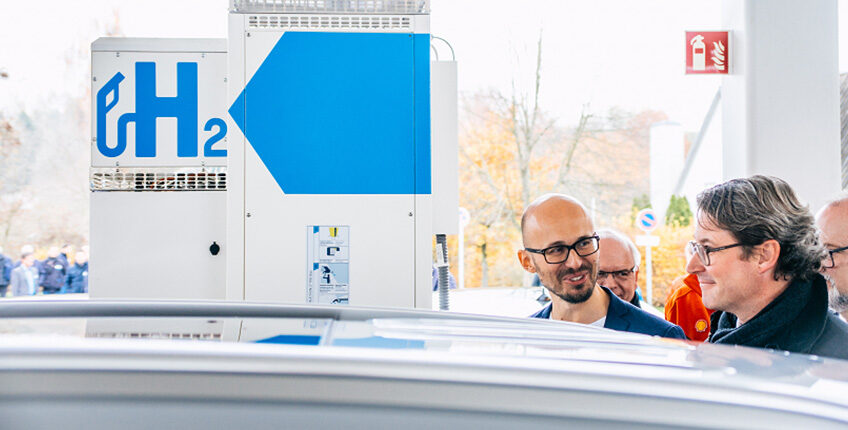The German Federal Ministry of Economic Affairs and the German Federal Ministry of Transport this week selected 62 large-scale hydrogen projects to receive government funding as part of a joint European hydrogen project (the so-called Important Project of Common European Interest, IPCEI). In doing so, they are implementing an important measure of the National Hydrogen Strategy.
Federal Transport Minister Andreas Scheuer:
“We are transforming Germany into a hydrogen nation. In doing so, we are rethinking mobility in a holistic, European way – encompassing everything from the energy system and drive technologies to the refuelling infrastructure. Currently, more than 95 percent of transport is still dependent on the use of fossil fuels. Therefore, we urgently need mobility that relies on renewable energies. Green hydrogen and fuel cells are a great complement to pure battery vehicles – regardless of the mode of transport. The fact is: We urgently need and WANT to push ahead with the switch to climate-friendly mobility. In order to cover all areas of mobility with zero-emission solutions, we need openness to different technologies. That is why we are supporting fuel cell technology as well as vehicle and component manufacturers in order not to miss the boat on an international level. Today we are taking a giant step towards climate-friendly mobility.”
Federal Minister for Economic Affairs Peter Altmaier:
“We are striving to become the number 1 in the world in hydrogen technologies. To achieve this, we are joining forces in Europe and initiating massive investments in the future technology of hydrogen through the first joint European hydrogen project. This will secure competitiveness and jobs – in Germany as well as in Europe. We are making more than 8 billion euros of federal and state funds available for the 62 German projects selected today, which cover the entire value chain – from hydrogen production and transport to applications in industry. In this way, we are taking a significant step towards achieving climate neutrality in our economy. A key area for this is the steel industry as well as the chemical industry, where several million tonnes of CO2 can be saved annually through these hydrogen projects.”
More information on the 62 hydrogen projects
The 8 billion euros in state subsidies are comprised of federal and state funds. About 4.4 billion euros come from the Federal Ministry of Economic Affairs; up to 1.4 billion euros from the Federal Ministry of Transport. The remaining funding will be provided by the federal states. In total, investments of 33 billion euros are to be triggered, of which more than 20 billion euros will come from private investors. The 62 large-scale hydrogen projects were selected from over 230 project outlines received and reflect the entire value chain of the hydrogen market.
In the BMWi area, 50 project outlines were selected. These include project outlines for production facilities that together comprise more than 2 gigawatts of electrolysis capacity for the production of green hydrogen. This corresponds to 40 percent of the target of 5 gigawatts by 2030 set in the National Hydrogen Strategy. Furthermore, we are also considering the infrastructure from the outset and are aiming to forge ahead with hydrogen pipelines with a length of around 1,700 km. A particularly large volume of emissions can be saved in the CO2-intensive steel industry. With ArcelorMittal, Stahl Holding Saar, Salzgitter Stahl and Thyssenkrupp Steel, all steel producers operating in Germany have submitted investment projects. A number of innovative projects in the chemical industry, such as BASF’s Ludwigshafen site, also show enormous reduction potential through the CO2-free production of hydrogen and its further use, e.g. for the production of ammonia or synthetic fuels for heavy goods transport or aviation. The Federal Ministry of Transport is funding 12 projects in the mobility sector. These concern the development and production of fuel cell systems and vehicles – including everything from passenger cars and trucks to municipal vehicles. In addition, for example, the establishment of a nationwide and cross-border networked hydrogen refuelling infrastructure is to be facilitated. A joint project in Hamburg will also address aviation and the maritime sector with a holistic approach: from fuel cell vehicles for port logistics or the H2 push boats in the port of Hamburg to H2 vehicles – starting with intralogistics at Airbus. With such integrated living labs, which are being set up on site, fuel cell technology is being advanced and put into operation.
The German projects are being funded within the framework of a European project (IPCEI Hydrogen) together with up to 22 European partner countries. The various national projects are to be networked in such a way that all countries benefit from each other and a European hydrogen economy can be jointly established. This initiative was launched by Federal Minister for Economic Affairs Peter Altmaier in December 2020 as part of the German EU Council Presidency. The aim is for the projects to be approved by the European Commission under state aid law before the end of this year. To this end, the Federal Ministry of Economic Affairs and Energy (BMWi) and the Federal Ministry of Transport and Digital Infrastructure (BMVI) are working closely and in a spirit of trust with the European Commission.
An overview of the projects and their distribution in Germany can be found at: www.bmvi.de/ipcei-standortkarte.
Image source: BMVI


